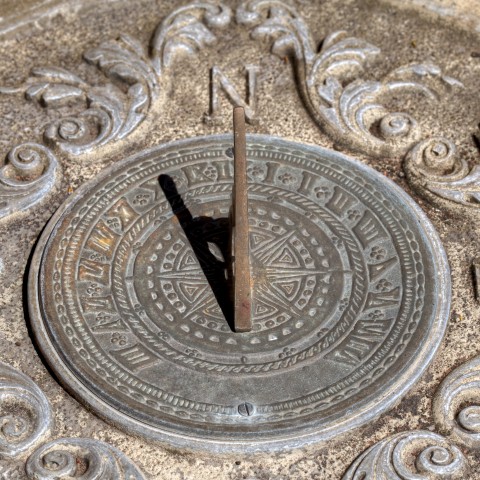
In the words of Abraham Lincoln, “It is a pleasure to be able to quote lines to fit any occasion.”
While this may be a truism, the unique allure of the aptly chosen and well-timed quote is something many of us give little thought to. The famous actress and singer Marlene Dietrich offers one insightful quote about quotes to help sum up this common phenomenon: “I love quotations because it is a joy to find thoughts one might have, beautifully expressed with much authority by someone recognized wiser than oneself.”
Now, how does this apply to Hebrew quotes specifically?
While slipping in a pithy quote would seem to be a universal practice, one might argue that Jewish culture prizes it more so than other cultures. This may be because, as the People of the Book, Jews have historically viewed specific—and often encyclopedic—knowledge of Scripture and the ensuant body of legal and literary works as a special badge of erudition. In fact, the phenomenon of citing a well-turned, previously coined phrase is already ingrained in the Hebrew Bible itself, which contains multiple instances of self-reference (i.e. quoting verses in one part of the Bible from another part).
It comes as no surprise that the Bible should be such a common source of quotes, widely read as it is the world over. Moreover, there are numerous works in the Bible that are quite clearly consciously preoccupied with the shaping of eloquent language to express the variety of life’s experiences with concision and panache. Indeed, by way of example, the Book of Proverbs is so named because it is just that: a sententious anthology of aphorisms beautifully shaped to the unique economical lines of the Hebrew language.
Indeed, Hebrew quotes from or about the Torah have long dominated the quotation scene, so to speak. This is largely due to the fact that, though Hebrew continued to be used more or less continuously in the post-Biblical era to produce religiously themed works of poetry and prose, there was no real secular Jewish culture or literature until relatively recently in history. On this note, it’s important to keep in mind that integration and assimilation were, for the most part, not possible throughout most of Jewish history, particularly in Europe. As a result, with a few notable exceptions, Jews didn’t really participate in secular culture even where it had taken root in the broader societies in which they lived.
Moreover, beginning from the Roman Exile around the year 70 BCE, Jews largely abandoned Hebrew as a spoken language. During this time, Yiddish (a blend of Hebrew and German) was the lingua franca of most European Jewish communities—or Ashkenazi Jews—and Ladino (a mixture of Hebrew and Spanish) was the preferred tongue among Sephardic Jewish communities, namely those from Spain. Indeed, outside of Israel, Hebrew was generally deemed inappropriate for use in describing lay matters; it became consciously reserved as לשון הקודש (leshon ha-kodesh), or “the language of holy matters.”
Thus, the vast majority of literary endeavors in Jewish communities were restricted to religious texts throughout most of history. However, particularly from the Haskalah movement of the late nineteenth century onward, European Jews (and later their brethren elsewhere) found entry into the secular, enlightened world. They henceforth began both partaking of and contributing to it, including through secular writings on all manner of topics. Many of these texts were, however, not in Hebrew, but rather in European languages like German, French, and English. One need only think of a few representative luminaries, such as Franz Kafka, Sigmund Freud, Arthur Miller, and Ayn Rand to realize that the Jewish contribution to modern-world literature has been nothing less than immense.
Apart from opening doors to the literary worlds of other languages, the Haskalah movement also gave rise to a new, secularized Jewish culture that emphasized the revival of Hebrew writing as a vehicle to express worldly (as opposed to religious) matters. The movement also marked a division between Yiddish- and Hebrew-language literature, the latter of which also represents a fairly broad corpus of secular (as well as religious) works.
With the expansion of the Zionist movement at the turn of the twentieth century, and with the return of ever-increasing numbers of Jews to their historical home in the Land of Israel, a new Hebrew literature flourished, as did the language’s lexis and range of expression. Hebrew novels, poems, and songs, as well as journalistic, academic, and technical texts, abounded with each passing year. Fast-forward to the modern State of Israel today, and Hebrew as a written language is not only alive and well, but more robust than ever. It’s also ever-evolving, with countless works published in every possible genre and field each year.
As a result of all this rich history, today’s Hebrew-speaking world has a broad and varied corpus of literature—both historical and new—to draw on when looking for the right quote for any given occasion. In today’s lesson, we’ll look at the top 25 Hebrew quotes, covering a range of topics from love to learning, and everything in-between. Enjoy!
 Table of Contents
Table of Contents
- Quotes About Life
- Quotes About Love
- Quotes About Time
- Quotes About Work
- Quotes About Family and Friendship
- Quotes About Wisdom and Foolishness
- Quotes About Food and Drink
- Quotes About Happiness and Health
- Quotes About Language
- Conclusion
1. Quotes About Life

We’ll start by looking at some Hebrew quotes about life that cover topics such as the passage of time, the pace of life, life’s different stages, and the difficulties that life puts before us.
1. ואבא תמיד אומר, תעזבנו יום, יעזבך יומיים. העגלה נוסעת, אין עצור. קפצת ממנה היום, חלפו שנתיים והנה נשארת מאחור.
-מאיר אריאל, “נשל הנחש”
Ve-Abba tamid omer, ta’azvenu yom, ya’azvekha yomayim. Ha-agalah nosa’at, eyn atzor. Kafatzta mimenah hayom, khalfu sh’natayim ve-hine nish’arta me-akhor.
-Me’ir Ari’el, “Neshel ha-Nakhash“
“And father always says, leave it a day, it will leave you for two. The wagon travels on; there is no stopping. Jump off it today, two years go by. And look, you’ve been left behind.”
-Meir Ariel, The Skin of the Snake
This quote comes from a famous song by modern Israeli singer-songwriter Meir Ariel. The lines cited speak to the notion that life can easily pass us by if we don’t keep up with the pace of things. The quote itself actually paraphrases a passage from the Talmud, the main corpus of Jewish legal interpretations. The original Talmud passage means, essentially, that if you leave something undone, don’t expect it to hang around waiting for you.
2. הכל עבר כל כך מהר וקצת קשה להיזכר איך פעם זה היה פשוט לשיר לחיות ולא למות.
-יהונתן גפן, “אתם זוכרים את השירים”
Ha-kol avar kol kakh maher u-ktzat kasheh lehizakher eykh pa’am zeh hayah pashut lashir likhyot ve-lo lamut.
-Yehonatan Geffen, “Atem Zokhrim et ha-Shirim”
“Everything went by so quickly, and it’s a bit hard to remember how once it was simple to sing, to live, and not to die.”
-Yehonatan Geffen, You Remember the Songs
This quote about life is from author, poet, and songwriter Yehonatan Geffen. It comes from a song that embodies the feeling of nostalgia for one’s lost youth and the innocence of days gone by. The line cited captures the particular poignancy of such nostalgia from an Israeli perspective: the loss of youth goes hand in hand with the realization of the dangers and difficulties of life in a world in constant war.
3. כל ההתחלות קשות, אך קשה מהן היא ההתמדה.
-חיים נחמן ביאליק
Kol ha-hatkhalot kashot, akh kasheh me-hen hi ha-hatmadah.
-Khayim Nakhman Bialik
“All beginnings are hard, but harder yet is perseverance.”
-Khayim Nakhman Bialik
This is indeed an oft-cited quote in Israel, coming from the pen of one of modern Israel’s greatest poets. Bialik was so influential as a pioneer of Hebrew language poetry—apart from his prominence as a Yiddish writer—that for a long period, much poetry from other Hebrew writers was essentially derivative of his style. This is another quote that paraphrases an earlier Rabbinic precept, according to which beginnings are particularly difficult. The quote goes further by pointing out that it’s even more difficult to stick to something over time.
2. Quotes About Love

Now, let’s take a look at a topic we all love: love! We’ll examine three Hebrew quotes on love, each quote representing one of the three general periods of Hebrew: modern, Rabbinic, and Biblical.
4. בין האפל לנסתר בעולמנו המר, אומרים שיש עוד תקווה. קוראים לזה אהבה ומחכים לבואה.
-ארקדי דוכין, “יש בי אהבה”
Beyn ha-afel la-nistar be-olamenu ha-mar, omrim she-yesh od tikvah. Kor’im le-zeh ahavah u-mekhakim le-vo’ah.
-Arkadi Dukhin, “Yesh Bi Ahavah”
“Between the hazy and the hidden in our bitter world, they say there is still hope. It’s called love, and we await its coming.”
-Arkadi Duchin, I Have Love
This quote by famous singer-songwriter Arkadi Duchin is a beautiful encapsulation of both the need for love in a broken world and the deep yearning we all feel for it.
5. כל אהבה שהיא תלויה בדבר, בטל דבר בטלה אהבה. ושאינה תלויה בדבר אינה בטלה לעולם.
פרקי אבות ה’:י”ט
Kol ahavah she-hi tluyah be-davar, batel davar batlah ahavah. Ve-she-eynah tluyah be-davar eynah batlah le-olam.
-Masekhet Avot 5:19
“All love that is reliant upon a thing annuls that same thing. Love that is not reliant upon a thing will last forever.”
-Chapters of the Fathers 5:19
This pearl of wisdom comes from a famous compilation of ethical teachings from the Rabbinic sages. It gives eloquent expression to the notion that true love is not dependent on material matters, and that any love that does depend on something material is bound to be lost if that material thing is lost. This is similar to, though more analytical and specific than, the English adage, “True love lasts forever.”
6. אני לדודי ודודי לי, הרעה בשושנים.
-שיר השירים ו’:ג’
Ani le-dodi ve-dodi li, ha-ro’eh ba-shoshanim.
-Shir ha-Shirim 6:3
“I belong to my beloved, and he belongs to me, he who pastures his flock among the lilies.”
-Song of Songs 6:3
This is one of the more famous Hebrew Biblical quotes from the seminal love song known as Song of Songs or Song of Solomon. The theme of שושנים (shoshanim), or “lilies” (sometimes translated as “roses”), is recurrent in this work. A flower surrounded by sharp thorns serves to emphasize the contrast of beauty versus pain, as well as the fragility of love and perhaps the care we must show in how we treat our beloved.
3. Quotes About Time

Though it’s often said that time is an illusion, it certainly is a pervasive aspect of life and a common theme in literature and art the world over. Hebrew culture is no exception. Here are a couple of Hebrew quotes about time.
7. גדול הוא האומץ לחכות מן האומץ לשפוך את הלב.
-נתן זך, “גדול הוא האומץ לחכות”
Gadol hu ha-ometz lekhakot min ha-ometz lishpokh et ha-lev.
-Natan Zakh, “Gadol Hu ha-Ometz Lekhakot”
“Greater is the courage to wait than the courage to spill one’s heart out.”
-Natan Zach, Greater is the Courage to Wait
This quote speaks on both the difficulty and the importance of holding out for the right moment rather than jumping the gun. The quote focuses specifically on the value of holding one’s tongue and speaking in the most opportune moment, rather than saying too much too soon. Of course, one can also apply these words to broader contexts.
8. לבל יהי יומי עליי כתמול שלשום. לבל יהי עליי יומי הרגל.”
-לאה גולדברג, “למדני אלוהי”
Leval yehi yomi alay ke-tmol shilshom. Leval yehi alay yomi hergel.
-Le’ah Goldberg, “Lamdeni Elohay”
“Lest my day be for me as yesterday or the day before. Lest my day be a habit to me.”
-Leah Goldberg, Teach Me, My Lord
This quote, from a poem by one of Israel’s most renowned poets, speaks on the importance of seeing each day with open eyes, renewing our energy, and making each day count. Here, in the form of a prayer, the poet asks God to help her avoid falling into a dull and repetitive routine so that she can remain engaged and excited about life each day.
4. Quotes About Work
Jews are well-known the world over for being hard workers. Indeed, the image of the חלוצים (khalutzim), or “pioneers,” who drained the swamps, planted the forests, and generally built a flourishing country out of deserts and wastelands is deeply ingrained in the Israeli psyche. These pioneers are regarded as the nation’s early heroes. On that note, let’s now have a look at some Hebrew language quotes about work.
9. היום קצר והמלאכה מרובה.
-פרקי אבות ב’:ט”ו
Ha-yom katzar ve-ha-melakhah merubah.
-Pirkey Avot 2:15
“The day is short, and the work abounds.”
-Chapters of the Fathers 2:15
This terse quote, attributed to the sage Rabbi Tarfon, is another gem from Chapters of the Fathers. In an inimitable style, it encompasses the notion that time is short but the labor before us is great, such that we must take advantage of the time we have to get things done before it’s too late. A rough parallel in English might be: “Make hay while the sun shines.”
10. העבודה הראשונה העומדת עתה לפני האנושות היא עבודה של חינוך עצמי.
א.ד. גורדון, “האדם והטבע”
Ha-’avodah ha-rishonah ha-’omedet ‘atah lifney ha-enoshut hi ‘avodah shel khinukh ‘atzmi.
-A.D. Gordon, “Ha-Adam ve-ha-Teva’”
“The first order of business facing humanity today is that of self-education.”
-A.D. Gordon, Man and Nature
This wonderful quote comes from A.D. Gordon, a חלוץ (khalutz), or “pioneer,” who moved to the Land of Israel at an advanced age to live on a kibbutz. He was somewhat akin to an Israeli Henry David Thoreau, emphasizing in his writings the importance of doing an honest day’s work (particularly in terms of agriculture), living in harmony with nature, and, as this quote reflects, ensuring one’s own self-education through life experience.
5. Quotes About Family and Friendship

Now let’s look at a theme of universal importance, namely that of family and friends. Here are some choice Hebrew quotes about family and friendship for you to ponder.
11. אני ואתה נשנה את העולם. אני ואתה, אז יבואו כבר כולם.
אריק איינשטיין, “אני ואתה”
Ani ve-atah neshaneh et ha-’olam. Ani ve-atah, az yavo’u kvar kulam.
-Arik Aynshteyn, “Ani ve-Atah”
“You and I, we’ll change the world. You and I, the rest will soon follow.”
-Arik Einstein, You and I
This is a lovely quote from iconic Israeli singer-songwriter and actor Arik Einstein. It speaks of the eternal hope of changing the world for the better, something that’s possible as long as we have just one person we can count on. The song doesn’t specify if the other person is family or a friend, but it clearly speaks of someone with whom there is a strong bond.
12. לא טוב היות האדם לבדו.
-בראשית ב’:י”ח
Lo tov heyot ha-adam levado.
-Bereyshit 2:18
“It is not good for man to be alone.”
-Genesis 2:18
This is, interestingly, the first piece of advice God offers Man in the creation story found in Genesis. God speaks these words to Adam just before informing him that He will create a partner for him (namely, Eve).
13. כשתשאל על אדם, שאל מי רעהו.
-רבי שלמה אבן גבירול, “מבחר הפנינים”
Ke-she-tish’al ‘al adam, she’al mi re’ehu.
-Rabi Shlomoh ibn Gabirol, “Mivkhar Pninim”
“Should you ask about a man, ask who his friends are.”
-Rabbi Solomon ibn Gabirol, Choice Pearls
This pearl of wisdom comes from a brilliant eleventh century poet and scholar whose influence on Hebrew culture has been profound over the centuries. Here, he eloquently expresses the notion that we are to be judged not only for our own merits and faults, but for those of the people with whom we choose to associate.
6. Quotes About Wisdom and Foolishness

The theme of wisdom versus foolishness is a common one throughout Hebrew literature of every era, such that there are seemingly endless quotations to draw on in this category. Let’s have a look at a few popular Hebrew quotes that touch on this topic.
14. זו שסיימה בית ספר יתר על המידה, שהוציאה את כל השפה על נסיונות. תחת חלון על השלחן מנחת תעודה: ‘עברה את כשלונותיה’.
נורית זרחי, “שיעורי העונות”
Zu she-siymah beyt sefer yeter ‘al ha-midah, she-hotzi’ah et kol ha-safah ‘al nisyonot. Takhat khalon ‘al ha-shulkhan munakhat te’udah: ‘’Avrah et kishlonoteyhah.’
-Nurit Zarkhi, “Shi’urey ha-’Onot”
“She who finished school and then some, who spent all her language on experience. Beneath a window on the table lies a diploma: ‘She passed her failures’.”
-Nurit Zarchi, Seasons’ Lessons
This quote, from Israeli poet Nurit Zarchi, may be considered a parallel to Mark Twain’s famous quip, “I have never let my schooling interfere with my education.” Both authors draw our attention to the fact that there is much wisdom to be gleaned outside the confines of the classroom. In Zarchi’s case, she focuses specifically on the need to go through hardships—to fall and pick oneself up again—in order to fully “graduate.” This is more or less what we mean when we refer to the School of Hard Knocks in English.
15. מן המקום שבו אנו צודקים לא יצמחו לעולם פרחים באביב.
-יהודה עמיחי, “המקום שבו אנו צודקים”
Min ha-makom she-bo anu tzodkim lo yitzmekhu le-’olam prakhim ba-Aviv.
-Yehudah ‘Amikhay, “Ha-Makom she-Bo Anu Tzodkim”
“From the place where we are right, no flowers will ever bloom in spring.”
-Yehuda Amichai, The Place Where We Are Right
This is a particularly apt poem for Israel, considering the endless polemics wrapped up in the Israeli reality over so many different things, including existence itself. Here, soldier-turned-poet Yehuda Amichai, widely considered modern Israel’s most important poet, poignantly reminds us that excessive insistence on being right very often comes at the expense of growth and peace.
16. אין שכל, אין דאגות.
-עממי
Eyn sekhel, eyn de’agot.
-’Amami
“No brains, no worries.”
-Popular saying
This one, though not attributed to any particular author, is a very common saying in Israel. The gist of it is that people who think less worry less, much like the English saying, “Ignorance is bliss.” In the Hebrew version, this is both a blessing and a curse. People who enjoy the tranquility of ignorance are also often unaware of problems, even when such awareness might be to their benefit or when their ignorance may affect others negatively.
7. Quotes About Food and Drink

Anyone who knows the first thing about Judaism knows that food and drink are a central theme in our culture. In fact, there’s even a popular dark joke in Israel, according to which all Jewish holidays can be classified as either feast days to celebrate the Jewish people surviving an attempted massacre, or fast days to commemorate the Jewish people falling victim to such a massacre. Let’s look at some representative quotes in the Hebrew language on food and drink.
17. על טעם וריח אין להתווכח.
-אברהם שלונסקי
‘Al ta’am ve-reyakh eyn lehitvake’akh.
-Avraham Shlonski
“One should not argue over taste and smell.”
-Avraham Shlonsky
This aphorism is a fairly ubiquitous one in Israeli life, and is something like a combination of the English sayings, “There is no accounting for taste,” and “To each his own.” Ironically (or perhaps not!), Israelis love to argue about food, drink, and other matters of taste. An altogether common conversation (or argument) topic in Israel, for instance, is where one can get the best hummus; agreement over one particular hummus shop is a rare creature, indeed!
18. למדני את השיר הפשוט של הלחם ופרוס לי חלק משלומך.
-רחל שפירא, “למדני את השיר הפשוט”
Lamdeni et ha-shir ha-pashut shel ha-lekhem u-fros li khelek mi-shlomekha.
-Rakhel Shapira, “Lamdeni et ha-Shir ha-Pashut”
“Teach me the simple song of bread, and slice me a piece of peace.”
This line comes from a beautiful song by poet and songwriter Rachel Shapira, who composed many of the most famous classics in Israeli music. This quote speaks of the importance of appreciating the simpler pleasures of life, such as a humble slice of bread. This sentiment is similar to what Walt Whitman meant when he wrote, “A morning-glory at my window satisfies me more than the metaphysics of books.”
19. ויין ישמח לבב אנוש.
-תהלים ק”ד:ט”ו
Ve-yayin yesamakh levav enosh.
Tehilim 104:15
“And wine shall gladden the heart of man.”
Psalms 104:15
This ancient passage from the Book of Psalms is often cited even in modern Hebrew to express, with eloquence and economy, the unique pleasures afforded by wine.
8. Quotes About Happiness and Health

Health and happiness are common themes in Hebrew culture, with connections often being made between the two. Let’s see some good examples of Hebrew quotes about happiness and health.
20. כי השמחה שלי היא המחאה שלי.
נעמי שמר, “על ראש שמחתי”
Ki ha-simkha sheli hi ha-mekha’ah sheli.
-Na’omi Shemer, “‘Al Rosh Simkhati”
“For my happiness is my protest.”
-Naomi Shemer, My Chiefest Joy
Naomi Shemer, often labeled the “First Lady” of Israeli music, was a prolific singer-songwriter particularly famous for her song ירושלים של זהב (Yerushalayim shel Zahav), meaning “Jerusalem of Gold.” This quote perhaps serves to help explain how Israel, despite the constant strain and strife of daily life under fire, is consistently reported among the happiest countries according to surveys. Not only is happiness a necessary answer to hardship, but a form of peaceful protest against violence.
21. אין עושר כבריאות, ולא נעימות כמו לב הטוב.
-רבי שלמה אבן גבירול, “מבחר הפנינים”
Eyn ‘osher ke-vri’ut, ve-lo ne’imut kmo lev ha-tov.
-Rabi Shlomoh ibn Gabirol, “Mivkhar Pninim
“There is no joy like health, and no pleasure like a heart of goodness.”
-Rabbi Solomon ibn Gabirol, Choice Pearls
Another wonderful quote from ibn Gabirol, this one almost seems to sum up the entirety of life! Indeed, it simply speaks for itself.
22. תוחלת ממשכה מחלה לב ועץ חיים תאוה באה.
-משלי י”ג:י”ב
Tokhelet memushakhah makhalah lev ve-’etz khayim ta’avah ba’ah.
-Mishley 13:12
“Hope deferred makes the heart sick, but a tree of life is a longing fulfilled.”
Proverbs 13:12
This pithy maxim from Proverbs touches on the power of following one’s dreams and ensuring they are realized, rather than waiting too long and letting them fade.
9. Quotes About Language

What better way to end our list of Hebrew quotes than to enjoy some quotes about language itself? Here they are.
23. בארץ הלוהטת הזאת, מילים צריכות להיות צל.
יהודה עמיחי, “שיר אהבה”
Ba-aretz ha-lohetet ha-zot, milim tzrikhot lihiyot tzel.
-Yehudah ‘Amikhay, “Shir Ahavah”
“In this blazing land, words must be shade.”
-Yehuda Amichai, Love Song
This quote speaks of the essential power of language to comfort and shelter us, and how vital that function of language is in a place as infernal as Israel has been.
24. מות וחיים ביד לשון, ואהביה יאכל פריה.
משלי י”ח:כ”א
Mavet ve-khayim be-yad lashon, ve-ohavehah yokhal piryah.
-Mishley 18:21
“Death and life are in the power of the tongue, and those who love it will eat its fruit.”
-Proverbs 18:21
This passage from Proverbs speaks of the power of language for both good and evil. It also sheds light on the fact that those who truly love language and use it wisely will reap the benefit from their own words accordingly.
25. לעזאזל השיר וכל אשר בו. אני צריכה 120 שקל חדש בחשבון אחרון.
-דליה רביקוביץ, “פרנסה”
La-’Azazel ha-shir ve-khol asher bo. Ani tzrikhah me’ah-’esrim shekel khadsh be-kheshbon akharon.
-Daliyah Ravikovitz, “Parnasah”
“To hell with poetry and everything that goes with it. I need 120 new Israeli shekels, when all is said and done.”
-Dalia Ravikovitch, Livelihood
To end on a lighter note, here’s a quote that captures the sardonic use of language so typical of much Israeli humor. Here, a writer ironically mocks her own craft, at once affirming (through the very fact of having written these lines) and dismissing (through the content of the lines) the art of poetry.
10. Conclusion
We hope you enjoyed our compilation of Hebrew quotes! Remember that learning Hebrew doesn’t just mean learning grammar, vocabulary, and pronunciation—it also means tapping into an entire culture, rich in wisdom gleaned over millennia of reflection. As you can now attest to, much of this wisdom is captured in the vast Hebrew library of literary works, both old and new. In that vein, which of these Hebrew quotes was your favorite, and why?
We at HebrewPod101 are convinced that learning a language is as much a cultural endeavor as it is a linguistic one, and we hope today’s lesson has enriched your understanding of Hebrew from a new perspective. Check out our wealth of resources on many other aspects of Jewish and Israeli culture to learn even more. When you learn Hebrew with HebrewPod101, you’ll always be prepared to say the right thing at the right time!
Shalom!










